2014.01.16
Critical Nago election could impact Henoko deal
Battle lines are sharply drawn in the small northern Okinawa city of Nago for Sunday’s mayoral showdown that could have a dramatic impact on how easily –or near impossible—the land reclamation and construction of a new military airfield and port play out.
At the heart of the furor are the incumbent mayor, 68-year-old Susumu Inamine, a staunch anti-base advocate who vows to fight having the Futenma Replacement Facility at Camp Schwab and adjacent Oura Bay, and challenger Bunshin Suematsu, who’s supporting the plan. The debate over constructing a new airfield to replace the controversial Futenma Marine Corps Air Station in densely populated Ginowan City in central Okinawa has raged for nearly 18 years, with Governor Hirokazu Nakaima breaking the impasse only last month by signing paperwork authorizing the land reclamation to begin.
Campaigning for the election in this city of 61,000 began last Sunday, drawing dozens of national and international news media to report on the election. Inamine is seeking a second term, while Suematsu, a former member of the Prefecture Assembly, is making his first foray into local politics. The 65-year-old Suematsu, backed by Prime Minister Shinzo Abe’s Liberal Democratic Party, argues Nago needs the replacement airfield, explaining it is essential to improving Nago residents’ lives by improving the economic revitalization measures promised by Abe’s government. Inamine is backed by the Japanese Communist Party, the People’s Life Party and the Social Democratic Party, as well as a local political party. The Democratic Party of Japan has not taken a stance in the election politics.
Suematsu says “We hope the national government will steadily proceed with the relocation plan and we will provide support.” Months ago, former Nago City Mayor Yoshikazu Shimabukuro was set to run again to promote the pro-military plan. He withdraw from the campaign even before it started, saying he didn’t want to split the pro-relocation vote. To be clear, Suematsu has now staked out a pro-relocation position. “I’d like to take this opportunity to settle the issue of relocating Futenma in cooperation with the central government and the governor,” he spoke out Sunday as he stood alongside Governor Nakaima while making his case to the electorate in the heart of downtown Nago City.
Although Nago’s a small city created only in 1970 with the consolidation of nine smaller villages and towns, it has played host to Camp Schwab, where Futenma’s replacement facility is slated. Many observers had expected the anger over the move to northern Okinawa to dissipate once the governor signed approval for reclamation work. Nobody anticipated Inamine to remain firmly in opposition.
“No town has become prosperous by hosting a base,” Inamine declared to potential voters on Sunday. “By winning the election,” he said, “we can tell the Japanese and U.S. governments no.” Other opponents call Inamine “the ultimate defender” of our position, but Inamine’s in a tough spot because his antagonistic approach is riling conservative voters, including businesses and construction contractors who stand to gain contracts and bring jobs to the area.
The New Komeito, the Liberal Democratic Party’s junior coalition partner, has pretty much been aligned in support of the Henoko relocation project, but the Okinawa chapter has veered away, calling for Futenma to be relocated outside the prefecture. Observers say they aren’t sure which way New Komeito’s 2,000 supporters will go in this close election, noting that Inamine four years ago beat Shimabukuro by only 1,600 votes. Henoko was a key issue in that election, with Inamine opposing the plan while Shimabukuro advocated growth for Nago City by supporting it.
This marks the sixth Nago election in which Futenma relocation has been at issue. In a 1997 referendum voters rejected the plan, but three subsequent, consecutive mayoral elections endorsed moving Futenma to Henoko. In 2010, Inamine edged out Shimabukuro, setting the stage for Sunday’s confrontation. Observers say Inamine’s win then may have been more the lucky result of confusion over Prime Minister Yukio Hatoyama’s Democratic Party of Japan policies, as opposed to residents’ true opinions on the issue.

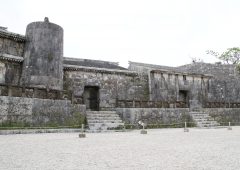 2024.07.07
2024.07.07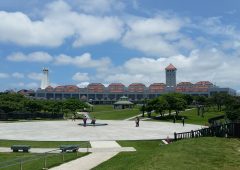 2024.06.21
2024.06.21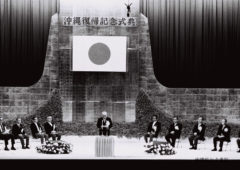 2024.05.15
2024.05.15 2024.02.07
2024.02.07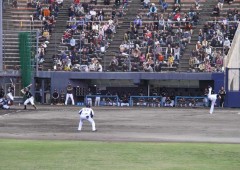 2024.01.31
2024.01.31 2023.11.02
2023.11.02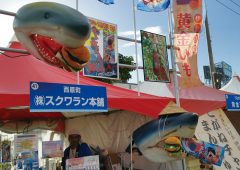 2023.10.26
2023.10.26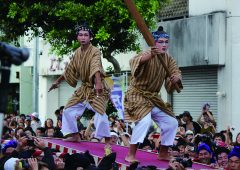 2023.09.29
2023.09.29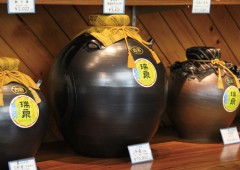 2023.09.01
2023.09.01






